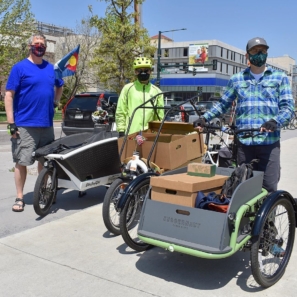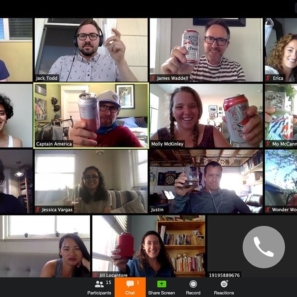Recalibrating Transportation: A 2030 roadmap
Bicycle Colorado, in partnership with SWEEP, NRDC, CoPIRG, and the Denver Streets Partnership, is asking Colorado leaders to meet greenhouse gas (GHG) reduction goals and to begin to address historic inequities by identifying and funding transportation projects that reduce vehicle miles traveled (VMT) by investing in transit, walking, biking, and safety.
In 2022, Colorado will award an unprecedented $4.0 billion to transportation projects. If our leaders continue the “business as usual” approach of costly road expansions, this once-in-a-generation opportunity will result in people and goods stuck in worsening traffic, alarming increases in greenhouse gas emissions, and more people dying unnecessarily when hit by motorists while walking and biking.
“These compounding challenges underscore the urgency for Colorado leaders to act now by investing the influx of state and federal funding in the expansion of transit, walking, and biking—rather than expanding road capacity for single-occupancy vehicles.”
— Rachel Hultin, Bicycle Colorado’s Sustainable Transportation Director
“Recalibrating Transportation: 2030 Roadmap to an Efficient, Equitable, and Safe Future for all Coloradans” establishes our 2030 vision of a transportation system that is efficient, equitable and safe for all Coloradans without needing to rely on a car; a system that preserves Colorado’s environmental health; and a system that provides access to affordable housing, employment and education. We are asking the Colorado Department of Transportation (CDOT) and Denver Regional Council of Governments (DRCOG) to rebalance transportation investments by shifting money from new lane miles to active transportation, transit and safety. That includes:
- Building out the Bus Rapid Transit (BRT) system and significantly expand transit service statewide
- Completing a safe and connected regional active transportation network
- Meeting Vision Zero goals by protecting vulnerable users and investing in safety measures on high-injury networks
- Upgrading all Main Streets to be people-friendly Complete Streets.
- Fostering livable communities with policies supporting equitable Transit-Oriented Development and location-efficient land use to reduce vehicle trips and pollution.
Moving forward, transportation planning and project selection needs to be recalibrated to meet GHG reduction requirements and ensure transportation investments are expanding sustainable transportation options. We believe these five steps will help bring transportation investments into alignment with community needs while reducing GHG pollution:
- Redefine how to measure success by leading with equity, access, safety, and impact.
According to State Smart Transportation Initiative (SSTI), the ultimate goal of most travel is to access services and activities. Instead of prioritizing vehicle speeds at the expense of other modes, CDOT and Metropolitan Planning Organizations (MPOs) should design our system to maximize accessibility by investing in projects that connect people to jobs and other activities in ways that are sustainable, efficient, healthy and affordable. - Reset project priorities based on current community input, data, and modeling.
Resetting project priorities will help CDOT, DRCOG, and other regional transportation planning agencies comply with the Greenhouse Gas Rule. Project selection based on robust and authentic community engagement and GHG mitigation strategies will ensure transportation dollars are best serving the people of Colorado. - Realign transportation investments to projects that reduce car dependency, increase access to mobility options, and prioritize equity.
Realigning transportation investments to focus on safe, connected mobility options, including transit and active transportation, will result in fewer cars on the road. Reducing cars on the road reduces transportation related pollution, improves safety for vulnerable road users, and improves the quality of life for all Coloradans. - Rebalance funding to optimize the use of existing infrastructure rather than adding capacity.
Rethinking efficient use of existing infrastructure to incorporate bus rapid transit, sidewalks, and protected bike lanes will result in mode shifts that reduce VMT and alleviate the need for expensive new highway expansions. Coupled with smart land use practices that encourage walkability and transit-oriented development, these funds are cost-effective investments to reduce GHG emissions with affordable, sustainable transportation. - Recognize that the best projects leverage synergies between multiple smart land use, transit, walking, biking, and safety strategies to create desirable, healthy, vibrant places.
“I look forward to working alongside our advocacy partners on constructive and collaborative ways for CDOT and DRCOG to act now to achieve our 2030 vision of a transportation system that is efficient, equitable, and safe for all Coloradans,” says Rachel Hultin, Bicycle Colorado’s Sustainable Transportation Director.
Leave A COMMENT
Our twitter feed is unavailable right now.
The Latest News
view all- Mar 22, 2024
- by Bicycle Colorado
Why Colorado Should Pass SB24-065 To Reduce Distracted Driving
- Advocacy Issues,
- Bicycling in Colorado,
- Bike Law,
- Get Involved,
- Laws & Funding
- No Comments








